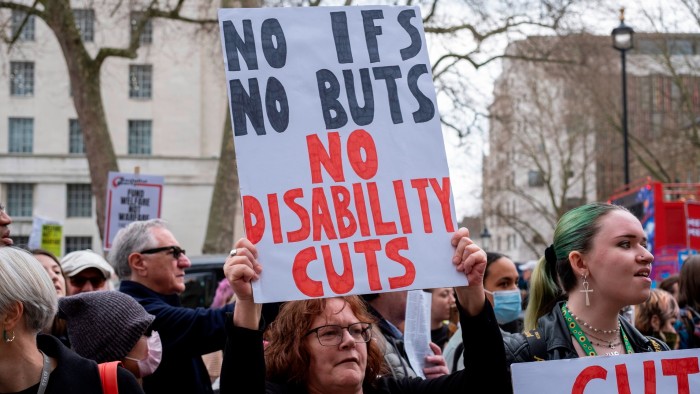Unlock the Editor’s Digest for free
Roula Khalaf, Editor of the FT, selects her favourite stories in this weekly newsletter.
Ministers are preparing to make marginal concessions to soften the impact of sweeping cuts to disability benefits, as they prepare for a major rebellion by Labour MPs against contentious welfare reforms next month.
Government officials are planning to provide some financial support to the roughly 150,000 carers set to lose their £80 a week allowance because the person they care for will no longer be eligible for benefits, according to people briefed on the discussions.
These carers — who receive a weekly carer’s allowance stipend at present — would be supported for a “transitional” period of several months after the disability reforms come into force next November under proposals set to be brought before parliament in June, the people said.
Prime Minister Sir Keir Starmer is bracing for the biggest House of Commons rebellion of his premiership next month in response to cuts to disability and incapacity benefits that are set to reduce support offered to more than 3mn people.
Labour’s bad performance in local elections in England last week — the governing party lost more than 180 council seats and the parliamentary seat of Runcorn and Helsby — has added fresh momentum to the rebellion.
Backbench Labour MPs are determined to capitalise on recriminations about the results to push for major changes to the reforms, including the earlier decision to scrap winter fuel payments for people not on benefits.
“The rebellion has 100 per cent grown since last week. The number one issue on the doorstep was winter fuel and number two was the welfare reforms last month,” said one MP co-ordinating the rebellion. “These [the rebels] are not the usual suspects. A lot of them are people on the right of the party.”
More than 100 Labour MPs were planning either to side against the government or abstain when stricter criteria for the personal independence payment — or Pip, a key disability benefit — were voted on in June, according to several MPs involved in organising the rebellion.
Evidence published by the Department of Work and Pensions last week, showing that the cuts to disability benefits will hit older people hardest, is likely to compound anger over the government’s refusal to reinstate winter fuel payments.
The DWP figures show that among current working-age claimants, more than half of those aged over 40 would lose eligibility for the “daily living” element of personal independence payments under proposed changes restricting it to those who face major barriers to everyday tasks.
Labour MPs are set to hold various meetings on Tuesday and Wednesday to discuss the local election results and concerns about welfare reforms, according to people with knowledge of the plans.
One of the meetings will be of the Red Wall Group, whose members’ seats in Labour’s traditional heartlands in the north of England are being targeted by Nigel Farage’s Reform UK.
DWP ministers are resolutely opposed to making any changes to the reforms proposed despite upset from some backbench MPs and some ministers, according to people briefed on their position.
But they hope to trim the size of the rebellion by producing an impact assessment of the £1bn expansion of job support schemes that will accompany the benefits cuts, which they believe could help hundreds of thousands of disabled people find work.
However, analysis by the Learning and Work Institute last month suggested that the extra funding for job support would help between 45,000 and 95,000 disabled people find jobs — a fraction of the 3.2mn losing out on disability and incapacity benefits.
The Office for Budget Responsibility, the fiscal watchdog, will not provide its assessment of the impact of those schemes until the Autumn Budget later this year.
A government spokesperson said: “We’re creating a sustainable welfare system that genuinely supports sick and disabled people into work backed by a £1bn employment support offer and will always be there as a safety net for those who will never be able to work.”
“We’re determined to fix the fundamentally broken system we inherited,” they added.




